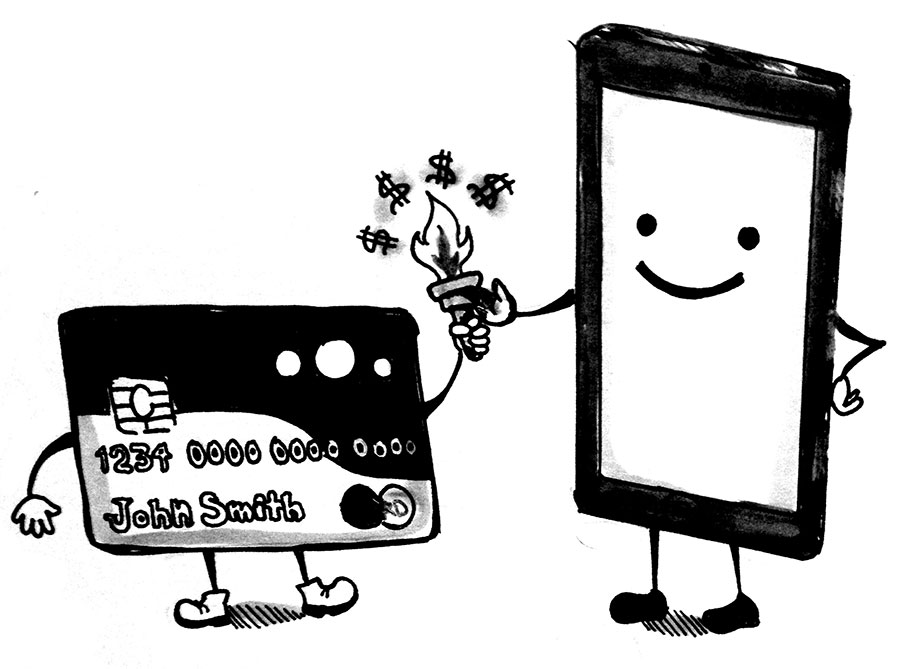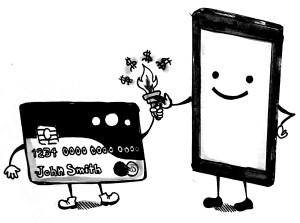Apple revolutionizes mobile payment methods
Time is money, and Apple’s recent addition of Apple Pay to iPhone 6 and iPhone 6 Plus software seems to capture this sentiment. Apple Pay has shaped the software to meet the needs and wants of its users more than other online payment methods have.
Apple has already secured significant market share when it comes to technological gadgets and mobile operating system software. From iPods to MacBooks and iPhones to iPads, consumers can’t get enough of Apple products. Now with Apple Pay, the company virtually transforms the iPhone into a credit card.
Recently, however, there has been some backlash for Apple Pay across media outlets. Based on the notions generated from the failures of similar payment methods in the past, skepticism is understandable. Critics question the functional use of the payment method; however, many fail to realize the ingenuity Apple Pay offers.
With the support of over 220,000 retailers, Apple Pay has gained a good amount of leverage in the retail market. Major credit card companies such as Visa, MasterCard and American Express all participate in Apple Pay. Large corporate banks, including Bank of America, Citi, Chase and Wells Fargo are in agreement to partner with Apple Pay. In addition to the major banks, Apple Pay will continue to expand in the future; it has already enlisted other banks such as U.S. Bank and the Navy Federal Credit Union as future participants within the next year. Famous retail chains such as Whole Foods, Chevron and McDonalds are just a few examples of where this new payment method can be used.
Recently, President Barack Obama signed the “Buy Secure” initiative to implement and secure quick change among consumer payment options in large retail stores. By Oct. 1, 2015, fraud liability will shift to the least EMV-compliant party among major U.S. credit card issuers, including MasterCard, Visa, Discover and American Express. Such necessity for change has garnered the attention of major retailers across the nation to adopt inventive programs such as Apple Pay.
Apple Pay, unlike Google Wallet and other virtual payment methods, offers promising upgrades to security and privacy for users. At a time when data breaches and fraudulence have become prevalent, Apple Pay has made great progress on the issue of security. The system is unique because the software uses tokenization, a secure method in electronic payments. The method does not store a user’s credit card information on the phone or anywhere else, but rather creates a single-use code, which expires and becomes irrelevant to hackers. The single-use code also solves the issue of privacy by linking to expiration of personal user data after the transaction.
The individual user’s credit card transaction can only be authorized with a fingerprint. Numbers and credit card information are stored within the iPhone’s special feature called “iPhone’s Secure Element,” which stores the data and is separate from the iCloud.
These upgrades pose major changes to the conventional use of credit card payment. With the touch of a fingerprint, users have a sense of control over both privacy and security. Under Apple Pay, users will presumably no longer have to fear fraudulent credit card transactions.
The urgency of President Obama’s executive order for retailers to transition to the EMV-standard reveals how significant of an innovation Apple Pay really is. Economically, Apple Pay truly ensures financial security. Technologically, Apple Pay implements a sense of effortless, straightforward and painless accessibility. Socially, Apple Pay integrates the continuous growth of social media to promote even easier methods to online and in-person pay.
It seems Apple has scored in the market again, this time with points that will generate positive output for generations to come. Its ability to secure users’ credit card information and employ an easier method to paying at the register will make it the modern form of credit card transactions.



Apple didn’t revolutionize anything! Google Wallet’s been around for several years now! God, the ignorance of this article is cringe worthy.